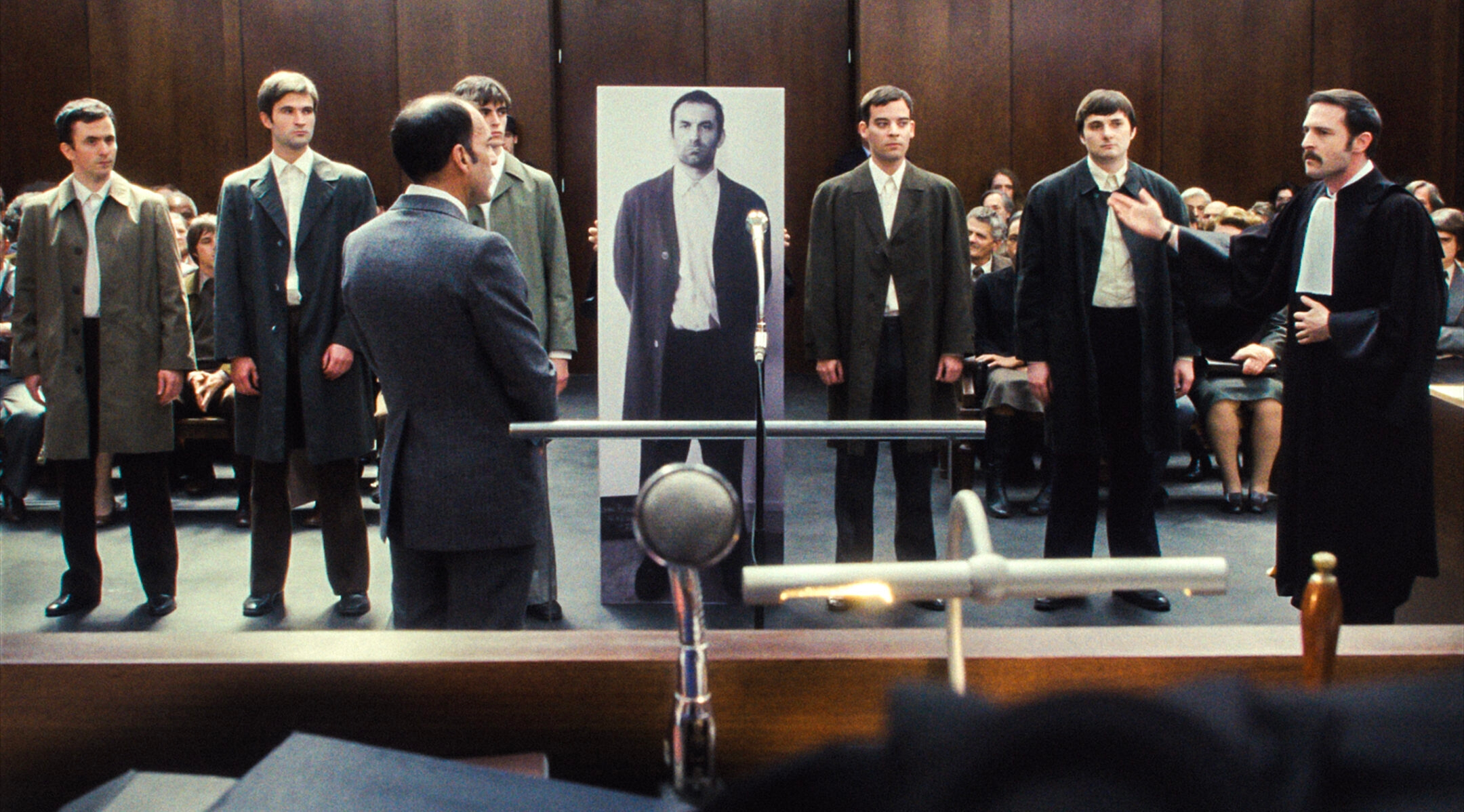Hollywood tore itself apart after this year’s Oscars ceremony following a Jewish director’s acceptance speech for a Holocaust film, in which he criticized Israel months into its war in Gaza.
The spat over Jonathan Glazer’s “The Zone of Interest” came alongside Jewish backlash to new diversity and inclusion standards from the Academy of Motion Picture Arts and Sciences, which had neglected to include Jews as an underrepresented Hollywood group. Taken together, it might have portended a difficult Jewish year in Hollywood. Would the world of prestige cinema — with its top prize awarded by a body that recently had faced controversy for downplaying the role of Jews in the film industry’s founding — fail Jews in their time of need, like so many other cultural organizations had?
But there was a surprise at the multiplex this year. As antisemitism has spiked, debates about Israel have consumed cultural spaces and anxiety over inclusion has simmered, Jewish movies are actually having a moment.
“The Brutalist,” a historical epic about a Hungarian Jewish architect trying to succeed in postwar America, and “A Real Pain,” a modern-day dramedy about two Jewish cousins on a Holocaust tour through Poland, are two heavy favorites in this year’s Oscar race after racking up big festival prizes. The new Bob Dylan biopic “A Complete Unknown” — which includes a brief glimpse of a photo album showing the boy once known as Robert Zimmerman becoming a bar mitzvah — has earned raves for the performance of Jewish lead actor Timothee Chalamet, and is expected to land well with mainstream audiences when it opens over Christmas.
Works focusing on Jewish clergy and religious life have also found success. This fall, “Between the Temples,” a low-budget neurotic comedy about a depressed cantor and his adult bat mitzvah student, was an indie box office hit, and Jewish supporting actress Carol Kane has become a dark-horse awards contender after a win at the New York Film Critics Circle. (Meanwhile, the small-screen romantic comedy “Nobody Wants This,” starring Adam Brody as a meme-worthy “hot rabbi” dating a non-Jewish woman, was one of the year’s most popular and buzzy TV shows.)
There’s a simple reason for these successes, entertainment industry professionals say: They’re good movies that people — both Jewish and not — want to see.
“I don’t think it’s exclusively because they are quote, unquote ‘Jewish stories,’” said Eric Kohn, a Jewish longtime film critic who currently works for a movie production company and as a programmer for a film center on Long Island. “I think it’s because they have other access points.”
And any echoes of the post-Oct. 7, 2023, Jewish experience are largely unintentional. With the exception of “A Complete Unknown,” all of this year’s big Jewish films — including “September 5,” a historical drama about the Israeli athlete hostage crisis at the 1972 Munich Olympics games — were shot before the Hamas attack and subsequent war.
In addition, not every filmmaker explicitly set out to make a project dealing with Jewish identity. While “A Real Pain” writer-director-star Jesse Eisenberg and “Between the Temples” director Nathan Silver have been up front about their interest in Judaism as a subject, “The Brutalist” director Brady Corbet and “September 5” director Tim Fehlbaum have said their films just happen to deal with Jews or Israelis, and that their central thematic interests lay elsewhere.
The movies bear that out: Kohn noted that they have additional draws beyond the fact of their Judaism. “The Brutalist” is as much the story of an uncompromising artist, and of the broader immigrant experience, as it is about Holocaust survivors. “A Real Pain,” starring Eisenberg and Kieran Culkin, is more explicitly about Holocaust trauma. But, Kohn noted, “It’s also a buddy movie with the guy from ‘The Social Network’ and the guy from ‘Succession.’”
And a Bob Dylan movie has broad cultural resonance, particularly since the figure at its center doesn’t publicly embrace his Judaism as much as many other Jewish celebrities. Still, in a year like 2024, any Jewish inclusion — no matter how incidental — was welcomed by many.

“The Goldman Case.” (Courtesy of Menemsha Films/Moonshaker)
“I liked the fact that they were movies about American Jews,” the Jewish film critic J. Hoberman, who writes frequently about Jews and cinema, said about most of the year’s Jewish offerings. “It was like a release, in a sense, to deal with the Diaspora rather than Israel.” Hoberman added that he was also a big admirer of “The Goldman Case,” a French courtroom drama based on the real-life trial of a 1970s-era Jewish radical but found a relatively smaller audience.
(The attraction beyond Judaism also links this year’s big Jewish movies to last year’s Jewish awards darlings “Oppenheimer,” “The Zone of Interest” and “Maestro,” which similarly held non-Jewish appeal: famous-person biopics, big-budget effects spectacles and cerebral, innovative arthouse filmmaking.)
Another crucial element linking “The Brutalist,” “A Real Pain” and “Between the Temples”: They were all independent productions, financed and filmed outside of the major studios before being acquired by mid-sized to large distributors after festival premieres. Hip indie distributor A24, Disney-owned label Searchlight Pictures, and megastudio Sony wound up releasing those films, in that order; “September 5,” too, was independently financed before being acquired by Paramount. (Partially to save costs, “The Brutalist” and “A Real Pain” were respectively filmed in Hungary and Poland — the countries where their characters encountered the horrors of the Holocaust.)
As the Oscar campaigns for the Holocaust-themed selections ramp up, their distributors appear to be leaning into the movies’ universal themes, rather than their Jewish ones — a shift away from many successful Oscar campaigns for Holocaust movies of the last few decades, ranging from “Schindler’s List” to “The Pianist” and beyond, which often placed the horrors of the Holocaust in the center of their pitch to Oscar voters as an important part of bearing witness.
“The films that we’re talking about in the best picture conversation, they’re not presenting anything related to Jewish identity that might make a non-Jewish audience uncomfortable,” Kohn said.
In addition, few of the above films tackle the subject of Israel directly (“The Brutalist” includes some late-in-the-film discussions of Zionism, but it’s not the movie’s focus). Even “September 5,” which dramatizes the Munich hostage crisis at which 11 Israeli athletes and coaches were murdered by Palestinian terrorists, does not center the Jewish or Israeli perspective, instead focusing on the TV sports journalists tasked with covering the tragedy — though the historical parallels to today’s Israeli hostage crisis and the ensuing war in Gaza still resonate.
The film won’t be released widely until January, but it hasn’t yet broken through the cultural landscape as much as Paramount had hoped. The studio was positioning it as a potential best picture contender at the Oscars, perhaps inspired by Steven Spielberg’s 2005 drama “Munich,” which covered the same subject and received five Oscar nominations including the top one. But it’s failed to generate much buzz in limited release, harming its chances, and Oscar predictors like Variety and Vulture have knocked its odds down; Kohn called the film “a complete dud at the box office.” (It did receive a lone Golden Globe nomination for best drama.)
Whether that’s due to its focus on Israel or to general disinterest amid a crowded film marketplace isn’t clear. On the film-reviewing social network Letterboxd, some of the most popular reviews of “September 5” ding it for supposedly being “Israeli propaganda.”

“No Other Land” (Antipode Films)
The war has certainly affected at least one Jewish film this year: the documentary “No Other Land,” which was directed by a collective of Israeli and Palestinian filmmakers and chronicles the Israeli military’s efforts to demolish the Palestinian West Bank village collective of Masafer Yatta. Like the other films mentioned in this article, it was made before Oct. 7 (with a small coda that takes place afterwards). But the movie’s supporters frequently cite the ongoing war — and accompanying rise in settler violence in the West Bank — in arguing for wider exposure.
Despite widespread critical acclaim and awards, including recently being shortlisted for best documentary at the Oscars, “No Other Land” has yet to find an official U.S. distributor. It will receive a limited New York release in January. The filmmakers declined an interview with JTA, saying they would wait until January to do further publicity for the movie.
Another controversial Israel-focused documentary, “The Bibi Files,” was also shortlisted for the Oscar and will soon be distributed as part of a nontraditional new-media model; it is backed by the Israeli activist group UnXeptable, which protests Israeli Prime Minister Benjamin Netanyahu and his government, and has a large U.S. presence. (Notably, the Oscar shortlist for best international feature included the Palestinian submission — “From Ground Zero,” an omnibus of short films shot in Gaza after Oct. 7 — but not the Israeli one, a drama about sibling grief called “Come Closer” that did not address the war.)
“I thought it was more than a film,” Hoberman, who named ”No Other Land” the best movie of the year, told JTA. “I was really glad to have a movie that was so outspoken about what I perceive as a terrible injustice. And at the same time, the fact that it could be made was hopeful in itself, if only in a theoretical sense.” His best-of list appeared in Artforum magazine, which itself underwent an Oct. 7-prompted leadership crisis shortly after the Hamas attack.
The failure of “No Other Land” to find distribution might say more about Hollywood’s post-Oct. 7 mood than the success of other Jewish-themed movies: films addressing the conflict are still seen as too risky for the bottom line. “No company feels like they can take the risk of the baggage that that film might bring, whether or not they agree with the perspective in it,” Kohn said.
Not every Jew is pleased with how this year’s crop of Jewish movies depicts actual Jewish life. Allison Josephs, an advocate for Jewish onscreen representation who runs the blog Jew in the City and recently undertook a survey of Jewish TV characters in collaboration with the University of Southern California’s Norman Lear Center, told JTA she believed the selections “follow the patterns of problematic Jewish films we’ve seen before” in both their casting and subject matter.
“We want to see Jews cast to play Jews, diverse casting for what Jews look like, as many of us are not white-passing. We want to see Jews taking pleasure in their heritage, being proud of their identity,” Josephs wrote. “We want to see stories beyond the Holocaust.“
For Josephs, who was also active in opposing Jewish exclusion from the Academy’s new diversity rules this year, how the makers of Jewish-related films feel about Israel is also an important factor in judging their success. “I’m googling the stars of these films and I don’t see any public support of Israel,” she wrote. “And that just adds insult to injury.” (Eisenberg has avoided discussing Israel in interviews; Guy Pearce, who plays a subtly antisemitic benefactor to Adrien Brody’s Jewish architect in “The Brutalist,” is a vocal pro-Palestinian activist who recently told Vanity Fair, “I’ve had someone say to me, ‘Let’s not forget what Hollywood is made up of. Be careful.’”)
At the end of the day, Kohn said, Jewish movies remain a niche in Hollywood. But it’s a niche that can reliably bring audiences — and one in particular — to the theater.
“My parents are liberal Zionists who went to go see ‘Between the Temples.’ And I didn’t have anything to do with that,” he said. “When they see a film that has Jewish themes, they go see it.”
JTA has documented Jewish history in real-time for over a century. Keep our journalism strong by joining us in supporting independent, award-winning reporting.






